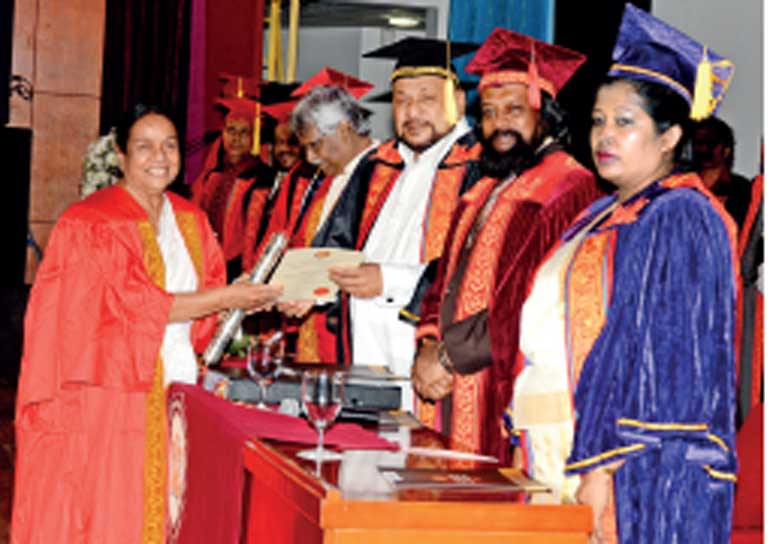Thursday Feb 12, 2026
Thursday Feb 12, 2026
Saturday, 14 October 2017 00:00 - - {{hitsCtrl.values.hits}}
 To see the ‘lady in white’ wearing a red and gold cloak was something unusual. But this was a special occasion. Nanda Malini was being conferred the honorary degree ‘Darshana Shuri’, Doctor of Philosophy – Fine Arts by the University of Visual and Performing Arts.
To see the ‘lady in white’ wearing a red and gold cloak was something unusual. But this was a special occasion. Nanda Malini was being conferred the honorary degree ‘Darshana Shuri’, Doctor of Philosophy – Fine Arts by the University of Visual and Performing Arts.
To receive the coveted degree from the hand of another renowned musician – Sangeeth Nipun Sanath Nandaisiri, Chancellor of the University – was also something special.
This was the first time that a female artiste was recognised by a university in Sri Lanka. Better late than never, as they say!
 Possibly many feel that she is just a singer and does not deserve to be honoured. She is so dominant in her singing that sometimes we tend to forget that as much as she is the topmost songstress in Sri Lanka, as a qualified musician she has trained thousands of children in music over the past few decades.
Possibly many feel that she is just a singer and does not deserve to be honoured. She is so dominant in her singing that sometimes we tend to forget that as much as she is the topmost songstress in Sri Lanka, as a qualified musician she has trained thousands of children in music over the past few decades.
She has a first class degree from Bhatkande – the highly-recognised institution in Lucknow – and years of experience from her young days.
Just as much as this was a ‘first’, Nanda Malini has been the first female singer to win awards at renowned awards presentations. When Pandit Amaradeva picked her to sing in Mike Wilson’s ‘Ranmuthu Duwa’ having listened to her singing over the radio, it was a complete surprise to her.
She was just 18 when she sang ‘Galana Gangaki Jeevithe’ in the film, for which she bagged the coveted award as the Best Playback Singer in 1963 at the inaugural Sarasaviya Film Festival. In later years when Presidential Awards were started, often she was the first choice.
From the time SLIM-Nielsen People’s Awards started, she has been voted as the Most Popular Female Singer year after year.
Nanda Malini is possibly the only artiste to have an orchid named after her by the Orchid Circle of Sri Lanka. It’s a hybrid – ‘Nanda Malini Ascocenda’.
The simple person she is, Nanda Malini never feels shy to talk about her early days when life was not that easy. The other day I watched her on internet talking about her difficult days as a child to a gathering of children, in a TV program.
She recalled a singing competition she took part in where the winner was to get an air ticket to Bombay. “I won the prize but I was not interested in going to Bombay. So I suggested to my father that we should go and ask for money to the value of the air ticket. My father and I went and met a high official in the company that sponsored the show. I did all the talking and he agreed to give money”, she said.
Having collected the money (she couldn’t remember the amount), they walked out.
“We had a bite and drank a sherbet from a wayside cart and moved on. I started thinking how the money should be used. My father being a tailor who worked late into the night, I remembered how my mother used to prepare a cup of tea and close it with a saucer every night before going to bed. Obviously he was drinking cold tea in the night. I decided to buy a flask so that he could enjoy a hot cup of tea. Once he finished tailoring a coat, his speciality, he used a ‘polkatu’ iron (using coconut shells to get the heat.) An electric heater would be an ideal gift, I thought. But then I realised we didn’t have electricity. We used the money to get electricity.”
The tough time she had in the early years made her get used to a simple lifestyle. She also disciplined herself in how she should fashion her musical career. Punctuality was something she developed. As the years passed when she had solo performances, the audiences knew her routine and made it a point to be at the venue on time.
Sharp at the scheduled time for the show to start, she steps on to the stage clad in a simple white saree. No hair-do. Any make-up (if and when TV recordings are done) is hardly noticeable. She greets the audience, sits down and begins to sing. She remains there for the nearly two hours. The fans listen. There is pin-drop silence in the hall except the applause at the end of each song.
In recent years I have followed the tremendous demand for her overseas. In Australia when random surveys are done by organisers before planning to get down Sri Lankan artistes, invariably she tops the list. And she never lets them down.
Very often the shows are during winter. I have personally observed how she protects herself taking great care to ensure that her voice is not affected. I have seen others who excuse themselves for a bad throat. Some start coughing and wait for hot water in between the singing.
The degree may not mean anything to her. But for an institute of higher education to recognise her is great.